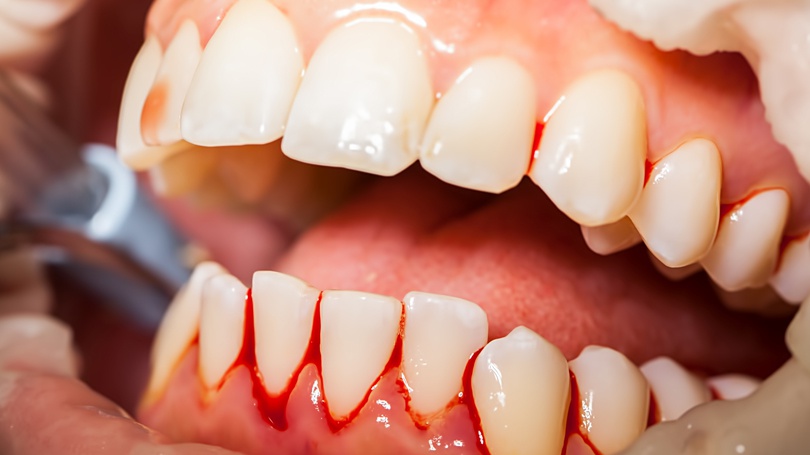Bleeding Gums: Causes, Prevention and Treatment

While a great deal of emphasis is placed on avoiding cavities, it is just as important to monitor your gum health. Your gums are not only essential to the health of your teeth but your systemic health as well. Light and occasional gum bleeding may not signify a problem, but gums that are red, are swollen, or bleed frequently or heavily are often an indication of a problem. It can be gum disease, a medication you are taking, or a sign that you are over-brushing or brushing too hard.
Poor Oral Hygiene
Suboptimal oral hygiene can lead to bleeding gums for a host of reasons. You may think of poor hygiene in terms of being consistently inadequate, but even temporary lapses can wreak havoc on your mouth. Consider that the quality of your oral hygiene is often defined by your willingness to stick with a proper routine each and every day. Brush twice a day with fluoride toothpaste for at least two minutes at a time, and floss daily.
Gum Disease
Gingivitis is the earliest stage of gum disease. Inflammation of the gums can lead to redness, swelling, and tenderness. It can also cause bleeding when you brush or floss. Gingivitis occurs as plaque accumulates along and beneath the gumline. This plaque is a sticky substance and will harden into tartar, which can generally only be removed through professional cleaning. Plaque is a breeding ground for bacteria that infects the gums and leads to bleeding, sensitivity, and other symptoms. The good news is that gingivitis is reversible. The bad news is that if left untreated, it can quickly evolve into periodontitis, which is not. Regular brushing and flossing, as well as routine dental checkups, are the keys to avoiding gum disease.
Pregnancy Gingivitis
Pregnant women are more prone to gingivitis and the bleeding and other symptoms that can come with it. The reason for this is raised hormone levels that increase blood flow to the gums. This increased blood flow actually makes the gums more prone to bacteria, which is why bleeding and tender gums are so common during pregnancies. Be sure to discuss your pregnancy with your dentist.
Medications
Your doctor may have prescribed a medication that thins your blood. With your blood thinned, it cannot clot as easily and thus makes you much more prone to bleeding along the gumline. During your regular checkups, discuss any new medications you have been prescribed. If medication is the cause of your gum issues, your dentist can likely adjust your oral care routine to minimize or eliminate the bleeding.
Flossing
Some light bleeding while flossing may be natural for you. If you suddenly bleed while flossing but never have before, consider whether you have switched products or changed up your habits. If you go days without flossing, it is not unusual for some light bleeding to occur when you floss again. It is best to floss every day and be mindful that there is no need to floss multiple times a day.
Bristle Hardness
The American Dental Association recommends soft-bristled toothbrushes for the average adult. Each person is unique and may be able to withstand a harder bristle or need an even softer bristle. If you change your toothbrush and suddenly start bleeding along the gumline, that is the likely culprit. Ideally, you should find a toothbrush that suits you and use it on a regular basis.
Diet
Vitamin C is essential to gum health. Ensure that you are getting the recommended allowance. Fresh foods and vegetables are excellent choices for your gums and are often high in vitamin C. Limit your intake of starches and sugars and be careful with processed foods. Although often difficult to diagnose, some processed foods contain ingredients that can irritate the gums and cause them to bleed.
Stress
Stress is a fact of life, and it is not just psychological. Stress weakens your immune system and makes you less able to ward off health issues, including gum disease. It also inflames blood vessels, which can slow the healing of the gums. It is essential to make a concerted effort to manage your stress levels.
Malocclusion
Malocclusion is the technical term for an improper bite, which means that your teeth are not ideally aligned. Misaligned teeth can lead to teeth grinding and undue pressure when biting down. These forces affect not only your teeth but the supporting bone and tissue. Over time, this can lead to gum recession and bone deterioration, which makes gum disease and bleeding much more likely.
Smoking or Vaping
Smoking as well as vaping damage your gums and make you more prone to gum disease. Once your gums bleed and other symptoms of the disease manifest, a nasty cycle begins. Dangerous bacteria may become trapped beneath the gumline and between the teeth and can even make their way into your bloodstream. Quitting these activities completely is the only way to prevent this from happening.
Be Proactive About Frequent or Serious Gum Bleeding
If you experience minor gum bleeding from time to time, discuss it with your dentist during your next regular checkup. Regular checkups are essential for ensuring your gums are as healthy as possible. If your gums are bleeding on a persistent basis or you have experienced a level of bleeding that has made you concerned about your health, do not wait for your next regular appointment. Schedule right away.
Your dentist can assess your gum health. He or she can talk to you about your oral hygiene routine and any lifestyle changes that may be affecting your gums. After diagnosing the cause, your dentist can advise treatment. If it is gum disease and you wait for the next scheduled checkup, the problem can become a lot more serious in that window of time, and you can cause yourself unnecessary discomfort.
Prevent Gum Bleeding
While minor bleeding on occasion is normal, gums that bleed frequently or substantially indicate a serious health concern. You should schedule an appointment with a dentist right away. Jeffrey D. Clark, DDS, can examine your gums and help you determine what is causing the bleeding. Dr. Clark can then advise the appropriate treatment or lifestyle changes. Schedule your checkup and gum disease treatment near you today by calling Scottsdale Cosmetic Dentistry Excellence at 480 585 1853.




